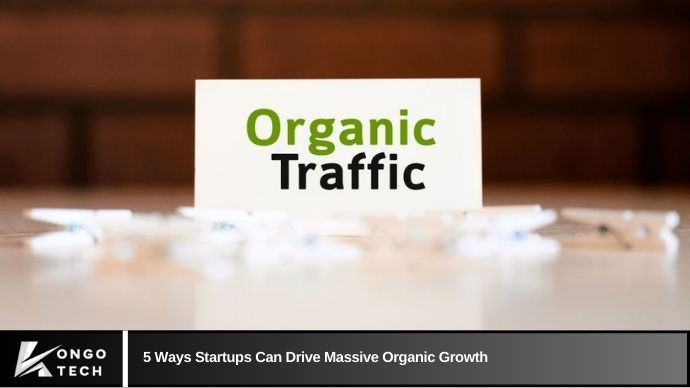For startups, driving organic growth is not just a luxury—it’s a necessity. With limited budgets and resources, startups must be strategic about building an online presence without relying heavily on paid ads or expensive marketing campaigns. Organic growth, driven by search engine optimization (SEO), content marketing, and user engagement, offers startups the opportunity to build a strong digital foundation that supports long-term success.
In this blog post, we’ll explore 5 powerful ways startups can drive massive organic growth, boost their search engine rankings, and attract more customers without breaking the bank.
Focus on Content That Solves Real Problems
One of the most effective ways for startups to drive organic growth is by creating high-quality, problem-solving content. Whether it’s blog posts, how-to guides, tutorials, or videos, content that addresses your audience’s needs or pain points is more likely to rank well on search engines and attract organic traffic.
Why Content Matters for Organic Growth:
- Google prioritizes valuable content: Google’s algorithms are designed to prioritize content that answers user queries in a comprehensive and meaningful way.
- Builds authority: Consistently publishing content that solves problems or educates your audience positions your startup as an authority in your niche.
- Increases engagement: Content that resonates with your audience encourages social shares, backlinks, and increased time spent on site, all of which boost your SEO performance.
Pro Tip: Start by conducting thorough keyword research to identify high-value keywords relevant to your business. Then, create in-depth content that thoroughly answers common questions or solves common problems within your industry. Aim for content that’s long-form and comprehensive—Google tends to favor this kind of content in search rankings.
Master On-Page SEO Optimization
On-page SEO is about optimizing individual pages of your website to help them rank higher on search engine results pages (SERPs). Without on-page SEO, even the most valuable content can go unnoticed.
Key On-Page SEO Elements:
- Title tags and meta descriptions: These are the first things searchers see in search results. Make sure they include your target keyword and are compelling enough to encourage clicks.
- URL structure: Ensure your URLs are short, descriptive, and contain relevant keywords.
- Header tags: Use header tags (H1, H2, H3, etc.) to structure your content and make it easier for search engines to understand.
- Keyword placement: Include your target keyword in the first 100 words, throughout the content, and in alt tags for images.
- Internal linking: Link to other relevant pages on your site to boost user engagement and SEO.
Pro Tip: Don’t just focus on primary keywords. Include LSI (Latent Semantic Indexing) keywords and related terms in your content to signal to search engines that your page covers the topic comprehensively.
Build High-Quality Backlinks
Backlinks are one of the most powerful ranking factors in SEO. When authoritative websites link to your content, it signals to Google that your site is trustworthy and relevant. For startups, earning backlinks from reputable sites can be one of the fastest ways to gain authority in your industry.
How to Build Quality Backlinks:
- Guest blogging: Reach out to well-established blogs or publications in your industry to contribute guest posts. In return, you can usually include a link back to your website.
- Broken link building: Identify broken links on relevant websites in your niche, and offer your content as a replacement.
- Create shareable content: Create in-depth guides, case studies, or research-driven articles that are valuable and link-worthy. Content that provides fresh data or insights often attracts backlinks naturally.
- Leverage PR opportunities: Pitch your story to relevant industry journalists, influencers, and media outlets to earn media coverage and backlinks.
Pro Tip: Focus on earning backlinks from high-authority websites with content relevant to your niche. Tools like Ahrefs or SEMrush can help you identify link-building opportunities.
Optimize Your Website for Mobile Users
With mobile-first indexing, Google primarily uses the mobile version of your website for ranking and indexing. This means that if your site isn’t mobile-friendly, it could significantly hinder your SEO efforts and prevent you from capturing valuable organic traffic.
Why Mobile Optimization Matters:
- User experience: A mobile-friendly site offers a better user experience, which leads to lower bounce rates and higher engagement.
- Increased visibility: Google prioritizes mobile-optimized websites in search rankings, especially for mobile search queries.
- Conversion rates: Mobile-optimized websites are more likely to convert visitors into customers, as many people browse and shop on mobile devices.
Pro Tip: Use responsive design so that your website automatically adjusts to different screen sizes. Test your site using Google’s Mobile-Friendly Test Tool to ensure it’s fully optimized for mobile devices.
Leverage Local SEO for Regional Growth
If your startup serves a specific geographical area, local SEO is one of the most powerful tools for driving organic growth. Local SEO helps your business show up in local search results when users search for products or services near them.
Key Local SEO Strategies:
- Google My Business (GMB): Claim and optimize your GMB listing. Make sure all your business information, such as name, address, and phone number (NAP), is accurate and consistent across the web.
- Local citations: Ensure your business is listed on local directories and review sites, such as Yelp, Yellow Pages, and industry-specific platforms.
- Customer reviews: Encourage satisfied customers to leave reviews on your GMB profile and other review sites. Positive reviews help improve local search visibility and build trust.
- Location-based keywords: Include city or region-specific keywords on your site to increase visibility for local search queries.
Pro Tip: To improve local SEO, focus on getting backlinks from local news outlets, local blogs, and community websites. These links boost both your local authority and overall SEO.
FAQs
1. How long does it take to see organic growth for a startup?
It can take 3-6 months for a startup to see noticeable organic growth, depending on the competitiveness of your industry, content quality, and SEO strategy.
2. Should I focus on short-tail or long-tail keywords?
Startups should focus on a mix of both. Long-tail keywords are less competitive and more targeted, while short-tail keywords bring higher search volume but can be harder to rank for.
3. Can social media help with SEO?
Yes, social media signals (such as shares, likes, and comments) indirectly influence SEO by increasing brand awareness, driving traffic, and earning backlinks.
4. What’s the best way to build backlinks as a startup?
Focus on quality over quantity. Guest posting, influencer collaborations, and creating high-value content are some of the most effective ways to build backlinks.
5. How important is local SEO for startups?
For startups with a local target audience, local SEO is crucial. It helps your business show up in local search results and attracts nearby customers.
Conclusion
For startups, organic growth is a powerful way to build brand awareness, increase website traffic, and generate long-term success without relying on costly paid ads. By focusing on high-quality content, mastering on-page SEO, building backlinks, optimizing for mobile, and leveraging local SEO, startups can carve out a strong online presence and gain a competitive edge in their industry.
Remember, SEO is a marathon, not a sprint. By following these five strategies and staying consistent with your efforts, you’ll be well on your way to driving massive organic growth that supports the sustainable success of your startup.

